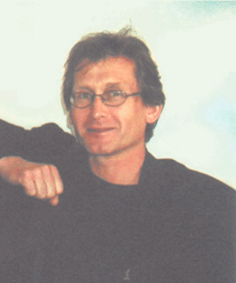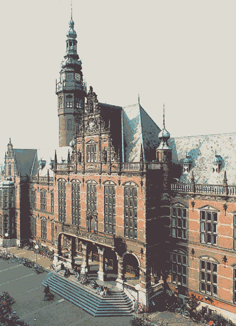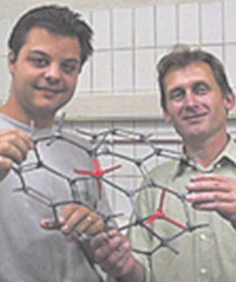Profile
Ben Feringa
Professor of Organic Chemistry, University of Groningen, The Netherlands
Ben Feringa
Professor of Organic Chemistry, University of Groningen, The Netherlands
Organic & Biomolecular Chemistry profiles the Chair of the Editorial Board.
 | ||
| Plate1 | ||
| 1978: University of Groningen, PhD, Supervisor Professor Hans Wynberg 1978: Royal Dutch Shell, Amsterdam, The Netherlands, Research scientist 1982: Shell Biosciences Laboratories, Sittingbourne, UK, Agrochemical research 1983: Royal Dutch Shell, Amsterdam, Catalysis research 1985: University of Groningen, Lecturer, Chemistry 1988 to date University of Groningen, Professor and Chair of Organic Chemistry |
Ben Feringa was born in 1951 in Barger Compascuum, a small farming village on the German border in the eastern part of the Netherlands. He currently lives with his wife Betty and their three daughters Femke, Hannah and Emma near Groningen, a pleasant university city and for many centuries the cultural and educational centre in the north of the country. Besides enjoying the girl power at home he takes care of his mini-farm and likes biking, hiking and ice skating. For the completion of the Frisian “Elfstedentocht”, a one day 200 km long distance skating tour, he received a silver cross.
 | ||
| Plate2 | ||
From an early age I was fascinated by reading books about explorers and discoveries. This interest was further stimulated by an inspiring high school teacher in natural sciences, and in particular the exciting experiments he performed convinced me that chemistry was an attractive choice to study at University.
Who was the first person to inspire you to research in chemistry?As an advanced undergraduate student I joined the group of Hans Wynberg in the Organic Chemistry Department. Always challenging his students to enter unknown territories, he was most influential and inspiring at the start of my career in chemical research. For instance the excitement in the lab over the discoveries in stereochemistry and asymmetric organocatalysis, perhaps 20 years ahead of its time, was highly influential on my own research in subsequent years.
Tell us something about the areas of chemistry you are currently researching?The research in my group is focussed on synthesis and stereochemistry. Our current programme includes the development of new asymmetric catalysis methodology and applications in natural product synthesis, catalytic oxidation, molecular switches and motors and self-assembly processes.
Why did you decide to research in these areas of chemistry?The reason that I choose to work on synthesis is that it is at the heart of chemistry. Synthetic chemistry is unique in that it is science and creativity. You can create your own objects of study, and design and discover molecules that never existed before. Of course it is also extremely rewarding to see that you can make a new material, catalyst or drug for the benefit of society. Stereochemistry is still shrouded in mystery which is one of the main reasons that it is a common theme in our research. On the other hand control and understanding of stereochemistry forces us to the limits for instance in the work on asymmetric catalysis or molecular recognition processes.
Where would you like to see your research in both the short and long term?In recent years we have introduced novel monodentate chiral ligands in asymmetric catalysis and it is particularly rewarding, and also an eye-opener, that high levels of stereocontrol in a variety of organic transformations can be achieved with relatively simple and cheap chiral ligands. These findings might provide us with important hints toward self-assembly and recognition phenomena in catalytic systems. Ultimately they will guide us in developing a broad range of novel highly selective and practical catalytic methods and contribute to the development of the sustainable—fully catalysis based—organic synthesis of the future.
On the other hand fundamental mechanistic and spectroscopic studies on chiral molecules have allowed us to design for instance the first synthetic molecular motor. Compared to the elegant molecular machinery in living nature one realizes at what a primitive stage we currently are. But again we can exploit the molecular approach common to organic chemistry to our advantage, as we are not at all restricted to the molecular building blocks of Mother Nature. Important goals in our research are the precise control of molecular motion, the construction of “molecular machines” and self-assembly of such systems to be able to communicate with the macroscopic world. Ultimately we hope to develop mechanical (supra-) molecular components for the nano-toolbox.
What would you most like to achieve in your lifetime in chemistry?As I seem to have an addiction to stereochemistry I would like to achieve real breakthroughs in our understanding of the subtle parameters that seem to control stereochemical phenomena, as this will have consequences reaching far beyond the field of chemistry for instance in molecular biology.
What do you find most enjoyable about your job on a daily basis?The most enjoyable part about my job on a daily basis is the privilege of being able to work with a team of young talented students and co-workers. It is particularly rewarding to see them within only a few years becoming professionals in organic chemistry and adding original contributions to the field of science. Being educated as organic chemists to follow a molecular approach they are destined to play a leading role in many fields of science in the decades ahead.
 | ||
| Plate3 | ||
It is amazing and often annoying that you have to justify being a chemist, despite the fact that our modern society could not exist without the advances made in chemistry and our future, with respect to for instance health, food or energy, will depend heavily on the chemical sciences.
Which scientist/chemist do you most admire through history and why?Looking at the history of science and chemistry I am a great admirer of Leonardo da Vinci, a genius in both science and art. Not unexpectedly you can add to my favourites van’t Hoff who provided the stereochemical basis for organic chemistry.
If you could successfully solve any scientific problem, what would it be and why?This is an extremely difficult question as there are numerous appealing problems, many of them immediately relevant for society. However if I could shed light on the mystery of the origin of homochirality in Nature I would be more than happy.
Professor Feringa can be contacted at the University of Groningen: Email: E-mail: feringa@chem.rug.nl; ; http://www.chem.rug.nl/feringa/Footnote |
| † Photographs show Professor Feringa, university buildings in Groningen, and Professor Feringa with Richard van Delden and a model of a molecular motor. |
| This journal is © The Royal Society of Chemistry 2003 |
